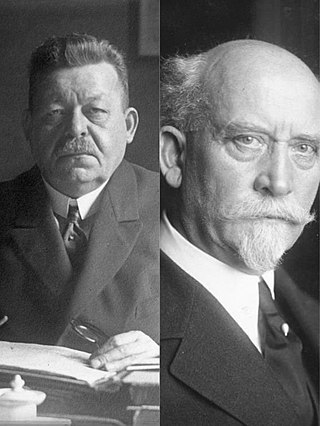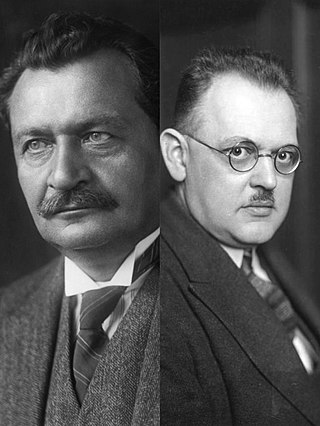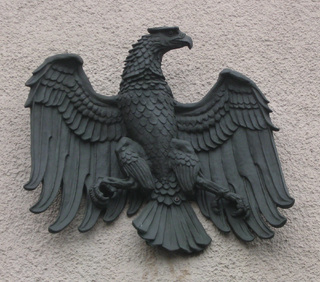
The Christian Social Union in Bavaria is a Christian democratic and conservative political party in Germany. Having a regionalist identity, the CSU operates only in Bavaria while its larger counterpart, the Christian Democratic Union (CDU), operates in the other fifteen states of Germany. It differs from the CDU by being somewhat more conservative in social matters, following Catholic social teaching. The CSU is considered the de facto successor of the Weimar-era Catholic Bavarian People's Party.

The Free Democratic Party is a liberal political party in Germany.

The Social Democratic Party of Germany is a centre-left social democratic political party in Germany. It is one of the major parties of contemporary Germany.

Otto Braun was a politician of the Social Democratic Party of Germany (SPD) during the Weimar Republic. From 1920 to 1932, with only two brief interruptions, Braun was Minister President of the Free State of Prussia. The continuity of personnel in high office resulted in a largely stable government in Prussia, in contrast to the sometimes turbulent politics of the Reich. During his term of office, Prussia's public administration was reorganized along democratic lines. He replaced many monarchist officials with supporters of the Weimar Republic, strengthened and democratized the Prussian police, and made attempts to fight the rise of the Nazi Party.

Federal elections were held in Germany on 5 March 1933, after the Nazi seizure of power on 30 January 1933 and just six days after the Reichstag fire. The election saw Nazi stormtroopers unleash a widespread campaign of violence against the Communist Party (KPD), left-wingers, trade unionists, the Social Democratic Party, and the Centre Party. They were the last multi-party elections in a united Germany until 1990.

Federal elections were held in Germany on 31 July 1932, following the premature dissolution of the Reichstag. The Nazi Party made significant gains and became the largest party in the Reichstag for the first time, although they failed to win a majority. The Communist Party increased their vote share as well. All other parties combined held less than half the seats in the Reichstag, meaning no majority coalition government could be formed without including at least one of these two parties.

Federal elections were held in Germany on 19 January 1919, although members of the standing army in the east did not vote until 2 February. The elections were the first of the new Weimar Republic, which had been established after World War I and the Revolution of 1918–19, and the first with women's suffrage. The previous constituencies, which heavily overrepresented rural areas, were scrapped, and the elections held using a form of proportional representation. The voting age was also lowered from 25 to 20. Austrian citizens living in Germany were allowed to vote, with German citizens living in Austria being allowed to vote in the February 1919 Constitutional Assembly elections.

The 1920 German federal election was held on 6 June 1920 to elect the first Reichstag of the Weimar Republic. It succeeded the Weimar National Assembly elected in January 1919, which had drafted and ratified the republican constitution. The election was delayed in three electoral districts – Schleswig-Holstein and East Prussia until 20 February 1921, and Upper Silesia (Oppeln) until 19 November 1922 – due to territorial plebiscites.

The Alliance of Independent Social Democrats is a Serb political party in Bosnia and Herzegovina. Founded in 1996, it is the governing party in Republika Srpska, with its leader, Milorad Dodik, serving as the current president of Republika Srpska. The party's vice-president, Željka Cvijanović, is the current member of the Presidency of Bosnia and Herzegovina, while SNSD member Radovan Višković is the current prime minister of Republika Srpska.

The Free State of Prussia was one of the constituent states of Germany from 1918 to 1947. The successor to the Kingdom of Prussia after the defeat of the German Empire in World War I, it continued to be the dominant state in Germany during the Weimar Republic, as it had been during the empire, even though most of Germany's post-war territorial losses in Europe had come from its lands. It was home to the federal capital Berlin and had 62% of Germany's territory and 61% of its population. Prussia changed from the authoritarian state it had been in the past and became a parliamentary democracy under its 1920 constitution. During the Weimar period it was governed almost entirely by pro-democratic parties and proved more politically stable than the Republic itself. With only brief interruptions, the Social Democratic Party (SPD) provided the Minister President. Its Ministers of the Interior, also from the SPD, pushed republican reform of the administration and police, with the result that Prussia was considered a bulwark of democracy within the Weimar Republic.
Free Voters is a political party in Germany. It originates as an umbrella organisation of several Free Voters Associations, associations of people which participate in an election without having the status of a registered party. These associations are usually locally-organised groups of voters in the form of a registered association (eV). In most cases, Free Voters campaign only at local government level, standing for city councils and for mayoralties. Free Voters tend to achieve their most successful electoral results in rural areas of southern Germany, appealing most to conservative voters who prefer local decisions to party politics. Free Voter groups are active in all of the states of Germany.
A bloc party, sometimes called a satellite party, is a political party that is a constituent member of an electoral bloc. However, the term also has a more specific meaning, referring to non-ruling but legal political parties in a one-party state as auxiliary parties and members of a ruling coalition, differing such governments from pure one-party states such as Nazi Germany and the Soviet Union, although such minor parties rarely if ever constitute opposition parties or alternative sources of power. Other authoritarian regimes may also have multiple political parties which are nominally independent in order to give the appearance of political pluralism, but support or act in de facto cooperation with the government or ruling party.

Bavarian nationalism is a nationalist political ideology that asserts that Bavarians are a nation and promotes the cultural unity of Bavarians. It has been a strong phenomenon since the incorporation of the Kingdom of Bavaria into the German Empire in 1871. Bavarian nationalists find the terms that Bavaria entered into Germany in 1871 to be controversial and claimed that the German government has long intruded on the desired autonomy of Bavaria, and calls have been made for Bavarian independence.

The Prussian Constitution of 1920 formed the legal framework for the Free State of Prussia, a constituent state of the Weimar Republic, from 1918 to 1947. It was based on democratic parliamentary principles and replaced the Constitution of 1848/50. During the National Socialist era, it was eroded to the point of irrelevance and following World War II lost legal force when the state of Prussia was abolished by the Allies in 1947.

The Fehrenbach cabinet, headed by Chancellor Constantin Fehrenbach of the Centre Party, was the fourth democratically elected government of the Weimar Republic. It took office on 25 June 1920 when it replaced the first cabinet of Hermann Müller, which had resigned due to the poor showing of the coalition parties in the June 1920 elections to the new Reichstag. The 1920 Reichstag replaced the Weimar National Assembly, which had served as Germany's interim parliament and written and approved the Weimar Constitution.

The 1931 Prussian Landtag referendum was an attempt to prematurely dissolve the sitting session of the Landtag (parliament) of the Weimar German state of Prussia. The referendum, which took place according to Article 6 of the 1920 Prussian Constitution, was triggered by a petition launched in the spring of 1931 by the anti-republican veterans' organization Der Stahlhelm. It was supported by several right-wing parties including the Nazis, as well as by the Communist Party of Germany (KPD). Even though 93.9% of those voting on 9 August 1931 opted to dissolve the Landtag, the referendum failed because the turnout of 39.2% did not meet the minimum 50% requirement.
State elections were held in the Free State of Prussia on 26 January 1919. The elections were held a week after the elections to the federal National Assembly, and were the first elections of Prussian institutions held using proportional representation and with women's suffrage. The election was also the first truly free and fair Prussian election, as it was the first election held after the abolition of the Prussian three-class franchise, which grouped voters by the amount of taxes paid and gave disproportionate weight to the wealthy.

State elections were held in the Free State of Prussia on 20 February 1921 to elect 406 of the 428 members of the Landtag of Prussia. The governing coalition of the Social Democratic Party, Centre Party, and German Democratic Party suffered major losses, losing one-third of its collective voteshare from 1919, but retained a narrow majority. The right-liberal German People's Party (DVP) and reactionary nationalist German National People's Party (DNVP) made the largest gains, with the DNVP becoming the second largest party by voteshare. The Communist Party of Germany contested its first Prussian election, winning 31 seats.

State elections were held in the Free State of Prussia on 20 May 1928 to elect all 450 members of the Landtag of Prussia. The governing coalition of the Social Democratic Party, Centre Party, and German Democratic Party retained its majority. The SPD recorded its best result since 1919 while the opposition German National People's Party suffered significant losses. The Centre Party, German People's Party, and DDP took modest losses; the Communist Party and Economic Party made modest gains.

State elections were held in the Free State of Prussia on 24 April 1932 to elect all 423 members of the Landtag of Prussia. They were the last free election in Prussia, as the next election in 1933 took place under the Nazi regime, and Prussia was then abolished after World War II.


















